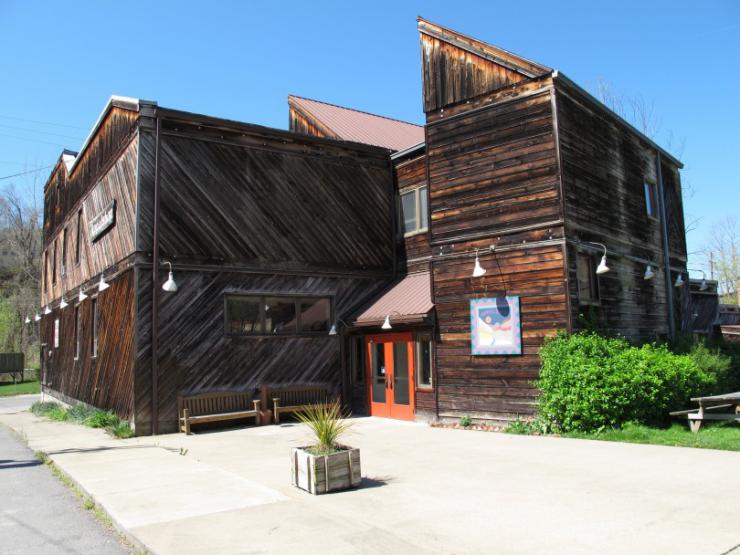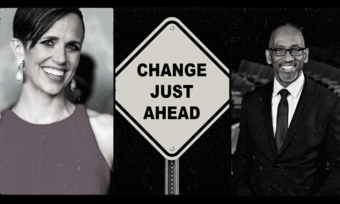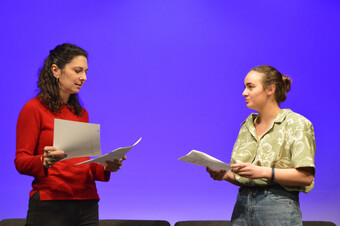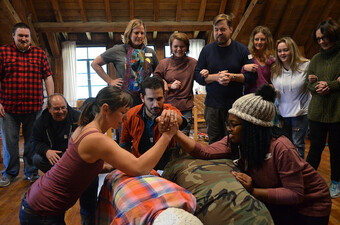Learning to Embrace Appalachia
“The definition of Appalachian art isn’t so much about, or it shouldn’t be so much about, the medium as it is about the experience of this place and how you choose to express it.” —Joy Gritton, Associate Professor of Art at Morehead State University from AMI’s video Embracing Culture: Appalachian Art
Growing up in Whitesburg, Kentucky, art was all around me. Home to the internationally known media arts and culture center, Appalshop*, I saw plays, viewed films, experienced crowded theatres awaiting to hear Bluegrass bands, and was best friends with the son of a painter. My parents, both independent filmmakers and founders of Appalshop, grew up in the coalfields and knew first-hand the stories, life, and culture the region held. In many ways, by growing up in an arts nonprofit, my childhood was unique. Yet having a world full of art was not. Quilters, chair makers, basket weavers, storytellers, and pickers are everywhere in central Appalachia.

To not have a skill, a craft, a way to pass the time in this rural part of America is rare. As a young person, I rarely saw or appreciated how much talent was around me. I was bored, annoyed by the lack of packaged entertainment, and eager to get out and see the world and all the alternative cultures it had to offer. My brother and friends started putting on punk shows throughout eastern Kentucky. They brought in touring bands, blue hair, and political patches. I clung to them tightly as I started copy-catting every fierce riot grrl I met, reading feminist literature and DIY zines. I began critiquing my family and the fabric of the place I lived, while my friends picked up electric guitars instead of banjos and made stencils instead of quilts. I finally felt like there was something that was mine, a culture we were a part of that few others understood or appreciated.
I began critiquing my family and the fabric of the place I lived, while my friends picked up electric guitars instead of banjos and made stencils instead of quilts.
I left the region after high school, excited for the world that awaited me. I first ventured to Olympia, Washington, and found all the parts of life I felt I was missing: farmer’s markets, independent movie theatres, bike shops, queers, activism, parks. I also found out that my accent was “cute,” that punks were actually trying to learn how to play the banjo, and that “I Hate the Capitalist System” by coal miner’s wife Florence Reese was a popular rallying song. I was confused and miffed by people’s fascination with what I called home. I began to get protective of my stories and mountain knowledge, restless for a constant view of the ever-changing hills. I read. I wrote. I listened. And I embraced my own history and culture. I learned how homegrown media had supported efforts by Kentuckians for the Commonwealth to pass a constitutional amendment that gave property owners the ability to stop strip mining on their own property.
I saw how organizing punk shows gave avenues for myself and other young people to express themselves and create new opportunities for youth to become invested in the area. I became amazed at the way little old ladies could move their feet when flat-footing to their favorite Ricky Skaggs song. I realized that art is living and breathing in Appalachia; it is even what defines us and the actions we choose to take. Our region influences the rest of America even as most write us off as conservative and uneducated. Many visitors to the region (whether they want to admit it or not) find themselves a little perplexed at how so much beauty can exist in a forgotten part of America. They want to sum up their experience in words and photos; some even come back and spend a few years here diving deep into our history and learning the crafts—they all become somewhat in awe of mountain people. Yet when you grow up here or when you decide to make a life here, there is something about what this place gives you through its art, nature, and cultural mannerisms that you can’t help but sit a spell and listen. That is what gives our people a resiliency and tie to the region they can’t shake off no matter where they go. As a good friend of mine and an amazing writer from Perry County, Ivy Brashear, just wrote, “I owe Appalachia everything, and I will give her everything I have, for all the days of my life.”
*Beginning in 1969 during the War on Poverty, Appalshop was as a federal workforce development project. The Community Film Workshop Council opened seven workshops throughout the nation. One was placed in Whitesburg, KY, in the heart of the coalfields. As the federal funds dwindled, many of Appalshop’s first employees saw opportunity—they began a multifaceted arts and culture center that now hosts Roadside Theater, WMMT mountain community radio, the Appalachian Media Institute (AMI), independent filmmakers, and our own archive. This post is published in honor of NET's "MicroFest USA: KY/TN Reconnect" which is happening October 26–27. Catch events live on #NEWPLAY TV.









Comments
The article is just the start of the conversation—we want to know what you think about this subject, too! HowlRound is a space for knowledge-sharing, and we welcome spirited, thoughtful, and on-topic dialogue. Find our full comments policy here
Great article. I'm from Vermont (which used to be Appalachia- north) and a generation older. I took me a while to realize that story telling was a necessary survival skill of my family, who were for the most part illiterate and had to pass on the skills of working the land and forest with horses and surviving the 32 below zero winter, with a wood stove and an outhouse. How great that you have given a fresh voice to your people and place. I appreciate it and and sure they do.